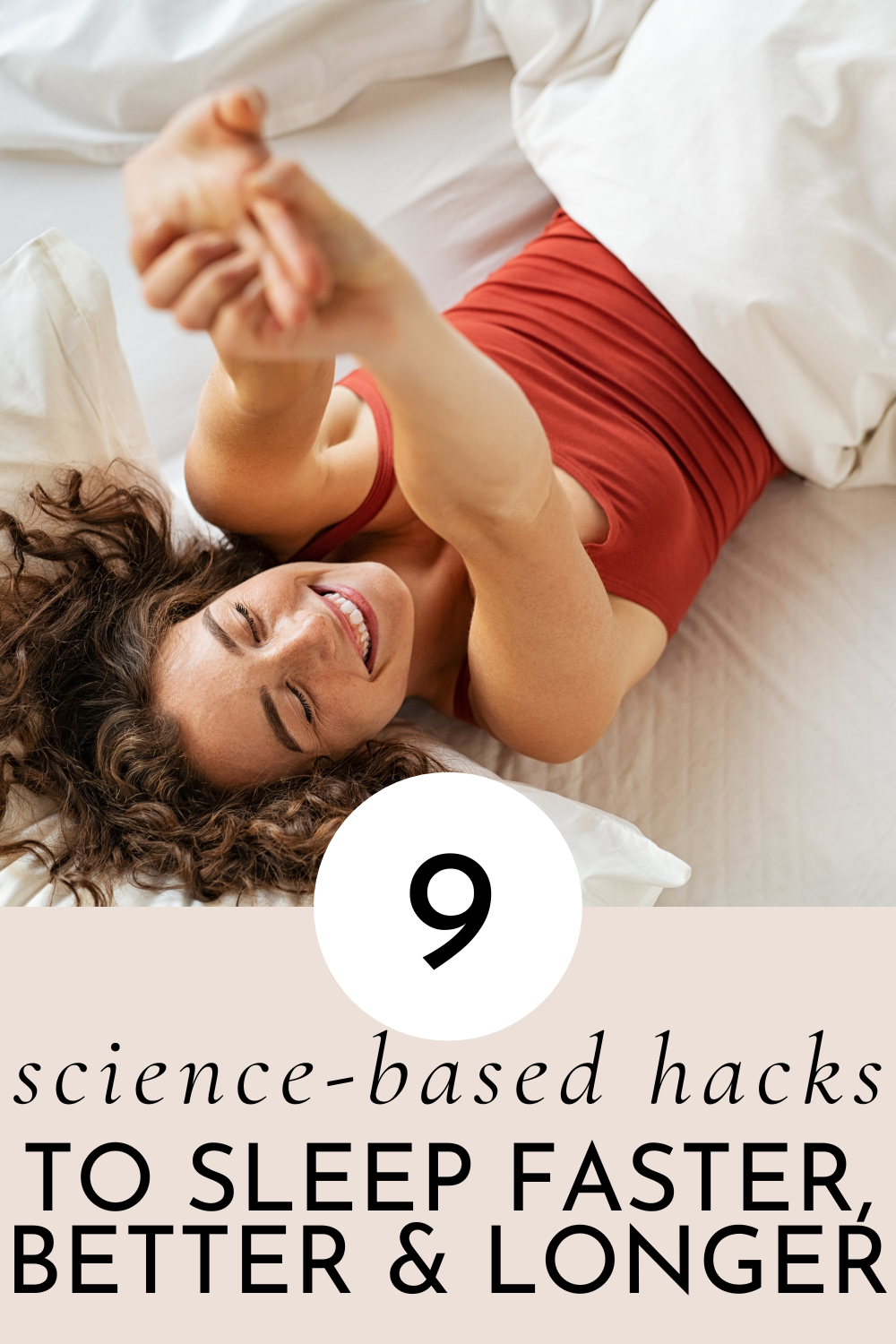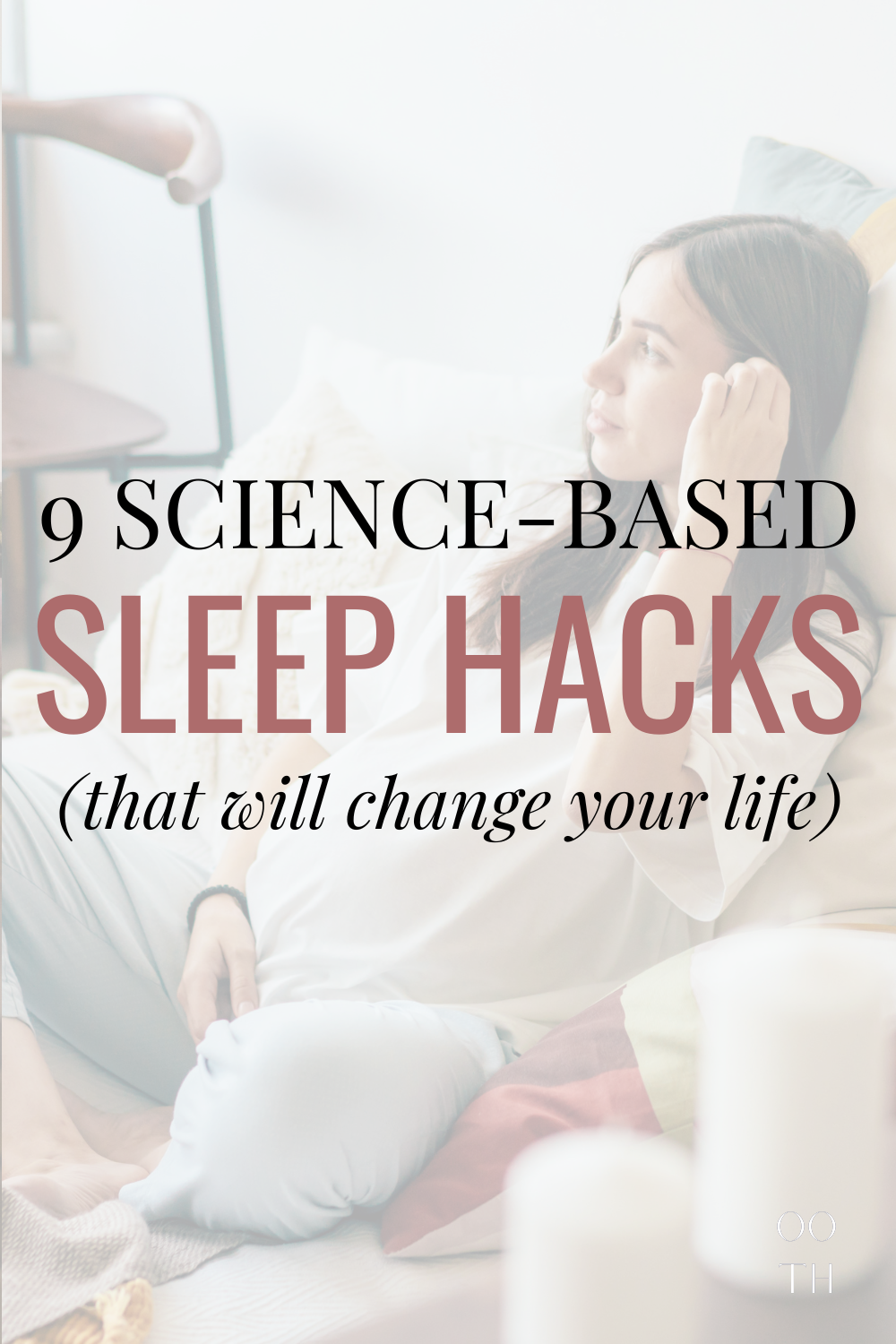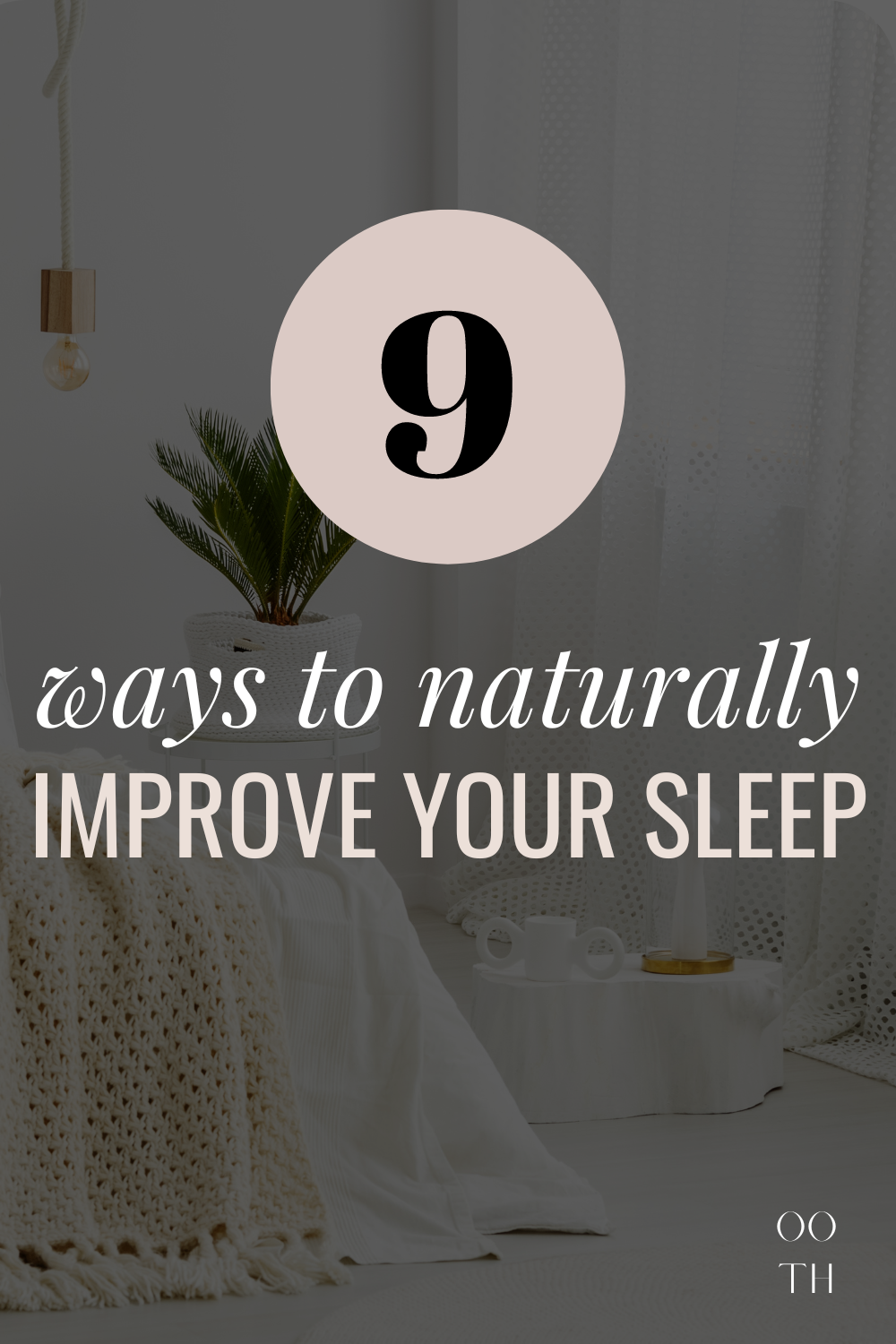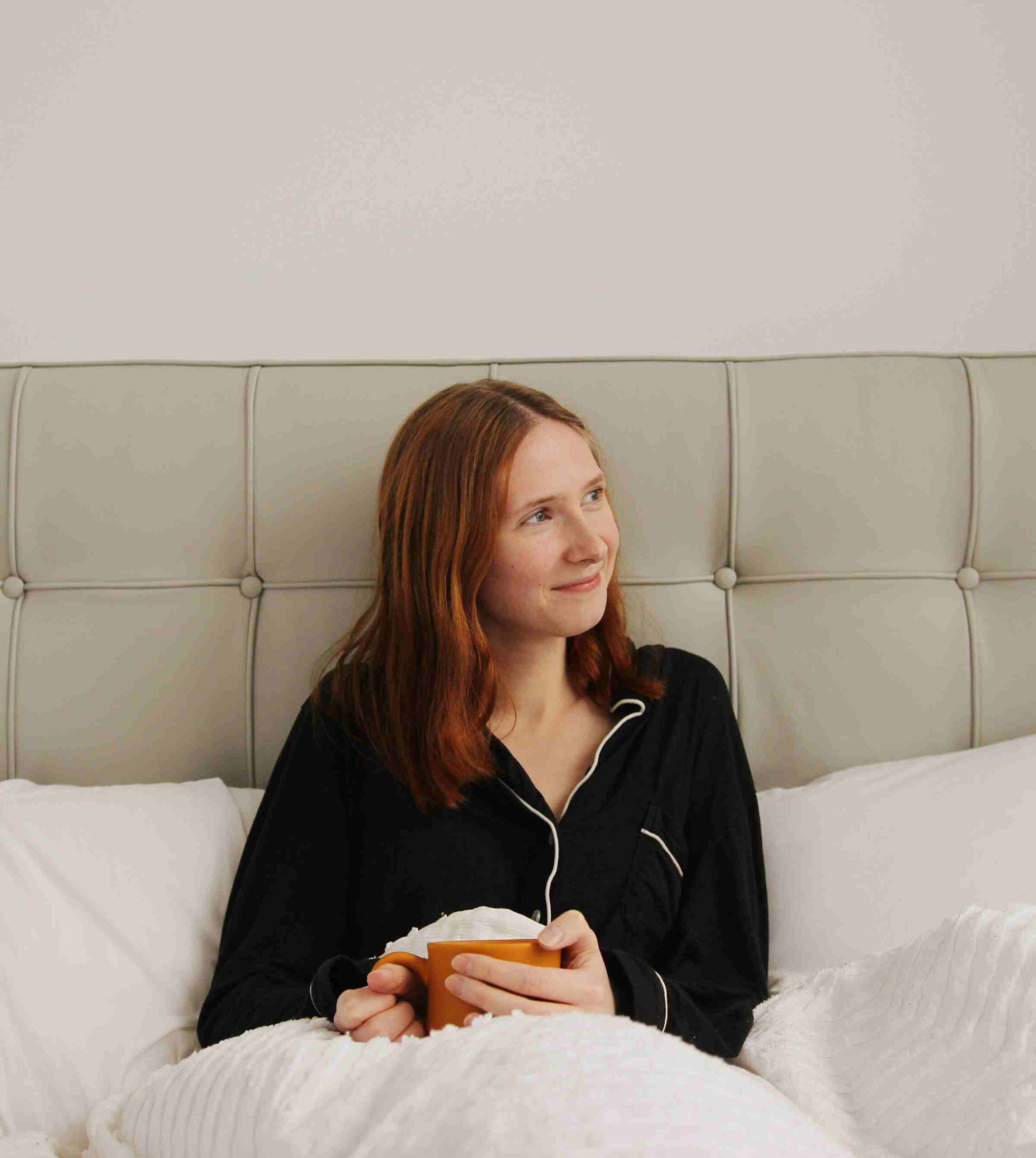How to Sleep Better | These 9 Science-Backed Sleep Hacks will change the way you rest & recuperate forever.

Whether you're trying to improve your immunity, think more clearly, or just get through the day with more energy, higher-quality sleep is the way to go. Sleep is a major factor in overall wellness, but according to the CDC, 33% of adults report not getting enough of it.
These science-based sleep hacks are tried, true, and tested. They'll walk you through everything from setting the scene, the optimal daily routines, and what to do when you can't sleep. These tools will help you sleep faster, longer, and better.
9 Ways to Sleep Better | Science Based Sleep Hacks
This post contains affiliate links. If you choose to shop through these links, I may receive a small commission at no extra cost to you. Thank you for supporting Out of the Habit & allowing us to continue bringing you high-quality content on creating a life you love.
1. Red light therapy
Perhaps one of the greatest obstacles to high-quality sleep is the mass amount of light confusion in our modern world. Though we were once ruled by sun & season, we now have the ability to recreate whatever light signals we want at anytime - which can be so disorienting to the body. Blue light, the light emitted from TVs, computers, and - you guessed it - smartphones, is extremely harmful to sleep. Blue light blocks melatonin and signals to your body that it's time to wake up - which is not exactly the goal when you're winding down for the night.
Red light, on the other hand, is theorized to stimulate melatonin production. A 2012 study found that after two weeks of athletes receiving 30 minutes of red-light therapy, their sleep, melatonin levels, and athletic performance all improved. Red light therapy may help you experience the same, and if nothing else, it'll help massively with #3 - which, in and of itself, is no small thing.
2. Don't do anything (well, anything much) outside of sleep in your bed
When you get into bed at night, does your mind relax? Are you ready to drift off? Or is it racing with possibilities, craving a couple episodes of your favourite show, basically looking to do anything other than rest?
Is this the first time you've gotten in bed today?
If you want to learn to sleep faster, one of the most crucial things you can do is make your bed a no-chill zone. When you spend time lounging, working, or just hanging out in the same spot that you sleep, you're signalling to your brain that this is an active environment. I'll be honest with you - this is the hardest thing on this list for me to implement. I love my bed, it's kind of a haven for me to just be cozy.
But by reserving your bed for sleep (and any other necessary horizontal activities), you're building a restful relationship with it. Over time, this pathway in your brain becomes stronger and more defined. Your body and mind will recognize that when you crawl in at night, you're ready to pass out. Not only will this improve the quality of your sleep, but it'll greatly speed up the process of falling asleep.
3. Develop a wind-down routine
It's not just a YouTube trend - nightly routines are backed by science. At least, when they're optimized for high-quality rest. Developing a wind-down routine has a similar effect to reserving your bed for sleep. It teaches your brain signals for sleep. You can decide what these are and what your wind-down routine looks like - although if you're a reader (or want to become one), this is a great spot to add it in.
For naturally-improved sleep, try setting the scene for your rest by turning off electronic devices, changing into comfy pajamas, and switching overhead lights off in exchange for some red lights therapy. Make a cup of chamomile tea, turn on a diffuser or light a candle, and grab a book. Don't set a time limit for yourself unless you really need one. Let yourself just relax into the evening until your body signals to you that it's ready for bed.
4. don't force it
Waiting for sleep when it's not coming is a truly terrible feeling. So rather than waiting in bed, begging your mind to be quiet, don't force it. If you can't sleep, don't stay in bed. Go for a walk or grab a book on the couch and let your mind do what it needs to.
One of the *worst* sleep habits I've had to break is this - trying to force myself to fall asleep when I wasn't ready. 9 times out of 10, I end up more alert and awake than when I started. It's okay that you might not get to sleep when you want to, but counting down exactly how many hours you've got left is not a more productive version of counting sheep. It's just stressful.
5. Keep your room cool & dark
As a general rule, sleeping in a warm or hot room is a no-go. Your body's temperature needs to drop slightly as you fall asleep, and that's hard to do when the heater's cranked. Experts recommend keeping your room somewhere between 60-67 degrees Fahrenheit, or 15-19 degrees Celsius.
Too much light is also quite disruptive. Speaking from experience, I spent the last year in an apartment with big, beautiful windows - something I never thought possible of being a negative. But those early summer mornings, when the sun got up at 5 - so did I. Your sleep environment has a lot to do with the actual quality of rest you're receiving.
Luckily, these are things that can be controlled - a small AC unit, some blackout curtains, or even a sleep mask can go a long way. I've linked some of my favourites below!
6. Clean your room
Turns out all of our moms were right, and cleaning your room is actually incredibly important. A clutter-free environment can be a huge help for high-quality sleep. Clutter in general is a huge source of stress, even if it doesn't feel like it. And stress directly inhibits sleep. Spending 15-20 minutes tidying your room every afternoon or evening can help reduce clutter buildup and set yourself up for success.
If you need some decluttering motivation, check out this free printable checklist of 100 Things to Declutter!
While I refused to put "stop stressing" on this list (because even though it's true, it's annoying advice), it's worth noting that doing whatever you can to minimize anxiety will pay dividends in this area.
7. Get sunlight in your eyes as early as possible
Believe it or not, the way you wake up has a lot to do with how you'll fall asleep. One of the best ways to improve your sleep is to get sunlight or very bright artificial light in your eyes as early as possible after waking up.
Many of us (????♀️) struggle to get outdoor light on an everyday basis, but this is incredibly essential to unlocking higher-quality sleep. This wake-up call resets your body's sleep timer and helps orient it to your schedule - something that unfortunately, most of our routines require us to start doing manually.
The sooner you're exposed to bright light, the sooner your body will produce melatonin - meaning you'll be able to sleep earlier in the night. This habit is also linked to reduced effects of seasonal affective disorder, insomnia, and PMS.
8. EXercise
A daily exercise routine is a great way to improve sleep quality. Even just 30 minutes of moderate exercise a day can lead to pretty instantaneous results. There's some research to suggest that working out in the morning may have a similar effect to sunlight. Helping wake your body up right away and therefore helping it fall asleep later on. Ultimately, though, whenever you can fit in a workout is great as long as it happens.
9. Be consistent
Consistency is key to any habit development - but if you're trying to retrain your body and mind, it's particularly important here. Repeating your wind-down routine, reserving your bed for sleep, getting sunlight, exercising, and going to bed at the same time aren't just things to drop in when you're having a rough night. These are lifestyle changes that can make a huge difference. But they're only/most effective when introduced as new rhythms in a new chapter.
Sleep is an incredibly key aspect of wellness. If you want to take your health seriously, this is an ideal place to start. Not only will you transform your evenings, but your energy, capacity, and days will be a whole new experience.
Having enough energy to last the whole day (without relying on caffeine) is genuinely one of the best feelings I've ever experienced. I went the majority of my adult life without knowing how accessible this was, but it is a gamechanger.
Better sleep, better life, better you. Don't "sleep" on these tips (sorry, I had to) - implement these 9 science-based hacks to improve your sleep today and watch your life change.




Comments Off on 9 Science-Backed Sleep Hacks That Will Change Your Life | How to Sleep Better